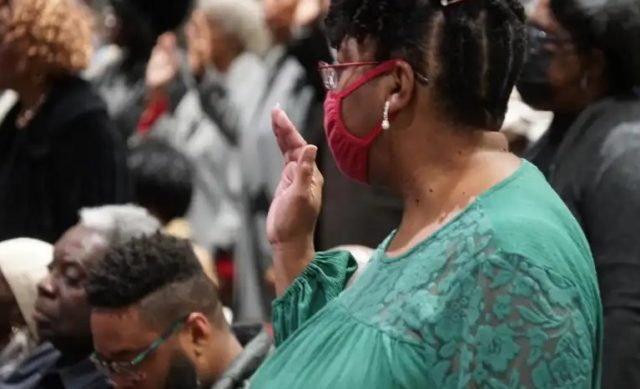
 Neighborhood association meetings offer a level of accessibility that city council meetings simply do not, Eric Hall writes. (Provided)
Neighborhood association meetings offer a level of accessibility that city council meetings simply do not, Eric Hall writes. (Provided)By Eric Hall | Special to The Times
An Opinion
In response to Birmingham City Councilor Hunter Williams’s opinion article, “Birmingham’s 99 Neighborhood Associations No Longer Serve Residents,” published January 22, 2025 on birminghamtimes.com, I must express my deep disagreement.
As a former Neighborhood Officer for the Central Pratt Neighborhood Association and a dedicated community activist, I firmly believe that our neighborhood associations are not only relevant but essential to the upliftment of our 99 neighborhoods and 23 communities.
 Eric Hall (Provided)
Eric Hall (Provided)Williams’ assertion that these associations have lost their effectiveness overlooks the systemic challenges they face. Our neighborhood groups can only thrive if they are provided with the necessary resources to tackle immediate needs and pressing issues.
Unfortunately, over the years, elected officials have systematically defunded these associations, imposed restrictive spending guidelines, neglected crucial public/private partnerships, and dismissed the voices of community members. This has resulted in numerous instances where neighborhood associations have opposed certain businesses or projects, only to see them approved through backdoor agreements, often to the detriment of our communities.
Moreover, neighborhood association meetings offer a level of accessibility that city council meetings simply do not. Most city council meetings are scheduled during typical working hours — 9 a.m. on a Tuesday, for example — making it nearly impossible for the average working resident to attend.
In contrast, neighborhood association meetings are typically held in the evenings, at times that allow working individuals to engage in discussions about the issues that affect their communities. However, due to the constraints imposed on these meetings, they often devolve into forums where residents merely report crime statistics or receive updates from police and fire departments, rather than engaging in meaningful dialogue about community needs.
The bureaucratic red tape surrounding community funding is another significant barrier. To access essential funds for neighborhood projects, associations must submit proposals three months in advance. I vividly recall a time before my tenure as a neighborhood officer when our association allocated $1,000 to Jackson Olin High School. It took over a year for the funds to be transferred from the city to the school board—an unacceptable delay that undermines our ability to effect change swiftly and effectively.
As volunteer leaders, we are driven by a commitment to our communities, unlike some elected officials who may prioritize their paid positions over genuine community engagement. Many of our community servant leaders are retired individuals and homeowners who continue to serve, because they are invested in the community where they live work and play. These are the last few that haven’t migrated over the mountain or other thriving municipalities. We remain hopeful, yet neglected!
It is clear that our current system is broken, but it can be remedied. We need leadership that is committed to collaborating with neighborhood leaders, rather than viewing us as mere tools to be utilized at their convenience.
Here are several actionable solutions to rejuvenate the relationship between neighborhood associations and city leadership:
- Streamline Funding Processes: We must eliminate the bureaucratic red tape that hinders our ability to access community funds. Allowing neighborhood associations to allocate funds for necessary projects without extensive delays is crucial. This would empower us to respond to the needs of our communities quickly and effectively.
- Enhance Communication Tools: Neighborhood associations should have access to community registries and emergency notification systems. This would facilitate better communication regarding community concerns and meeting announcements, fostering greater participation and engagement among residents.
- Invest in Community Infrastructure: Our recreation centers and community meeting spaces need modernization. Safe, accessible, and well-equipped venues will allow us to conduct meetings without worrying about weather disruptions or inadequate facilities. This investment is not just in physical spaces but in the vibrancy and involvement of our communities.
- Change Meeting Times: City council meetings must be scheduled at times that allow working residents to attend. Many municipalities have successfully moved their meetings to evenings to ensure that taxpayers can voice their concerns and hold elected officials accountable. Birmingham should follow suit.
- Empower Local Leadership: Recognize neighborhood associations as pivotal stakeholders in our city’s progress. We are not merely objects to be summoned for approval; we are integral partners in shaping the future of our neighborhoods. Our voices matter, and our input should be considered seriously in planning and decision-making processes.
In the words of Dr. Martin Luther King Jr.: “We may have all come on different ships, but we’re in the same boat now.” This sentiment underscores the importance of unity and collaboration in our community efforts. If we are to address the challenges facing Birmingham effectively, we must work together—elected officials, neighborhood associations, and residents alike.
In conclusion, rather than dismissing the value of neighborhood associations, we should recognize their potential as vital agents of change. By removing barriers, enhancing communication, and investing in our local infrastructure, we can empower these associations to serve their communities more effectively. Let us build a Birmingham that thrives through collaboration, where every voice is heard, and every neighborhood has the resources it needs to flourish.
Eric Hall is a former Neighborhood Officer for the Central Pratt Neighborhood Association and a Birmingham community activist.

 3 days ago
2
3 days ago
2









 English (US)
English (US)